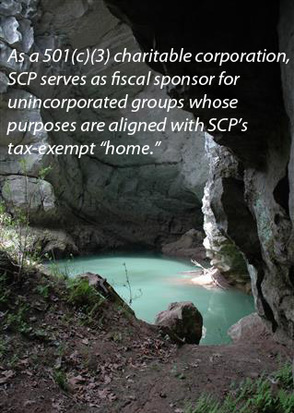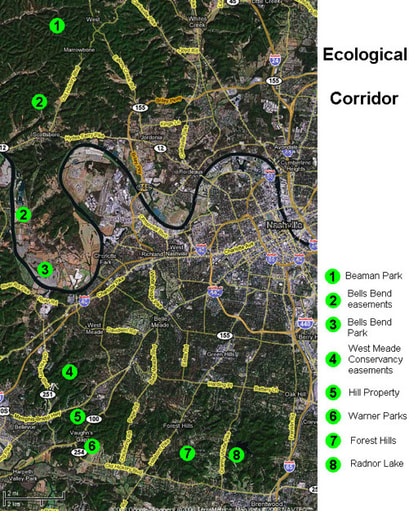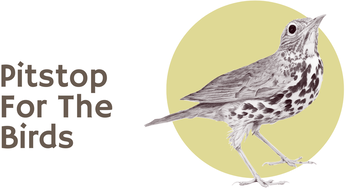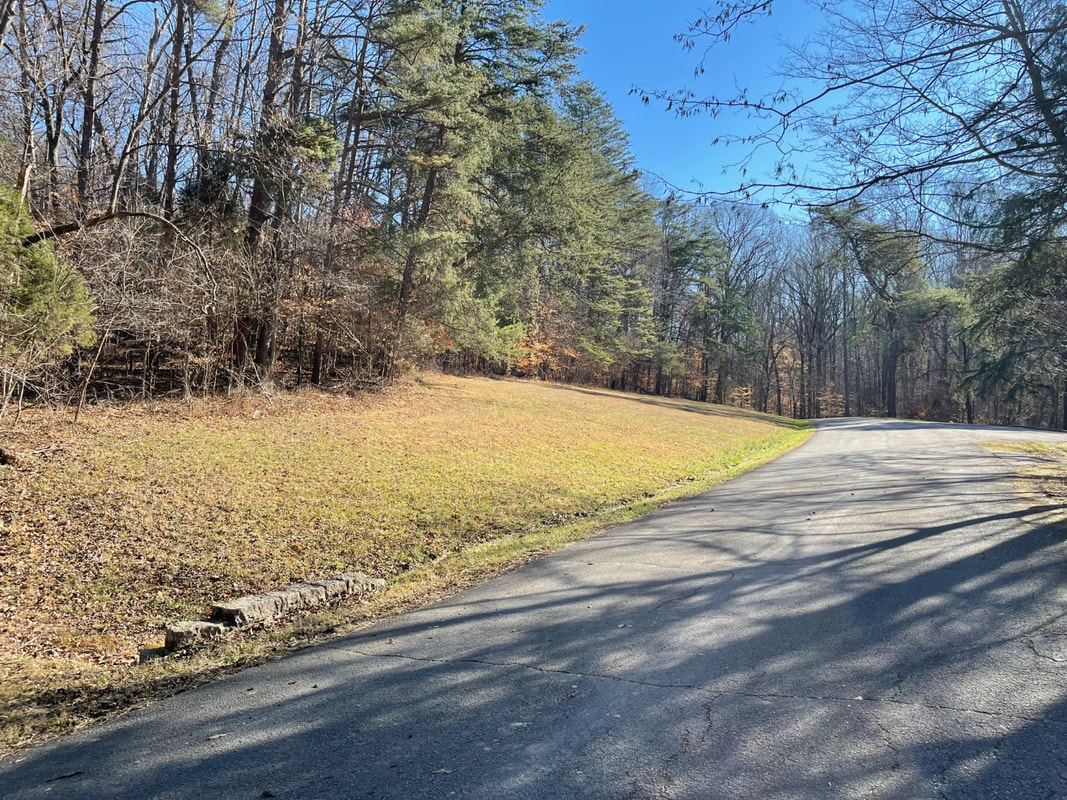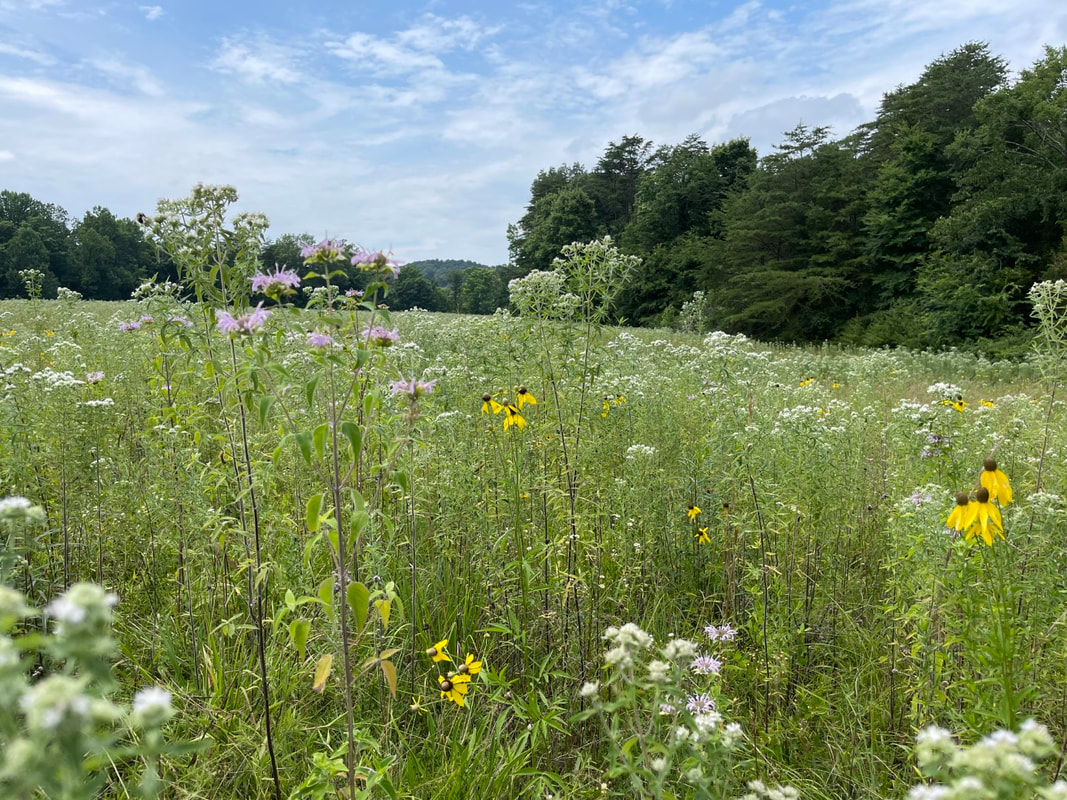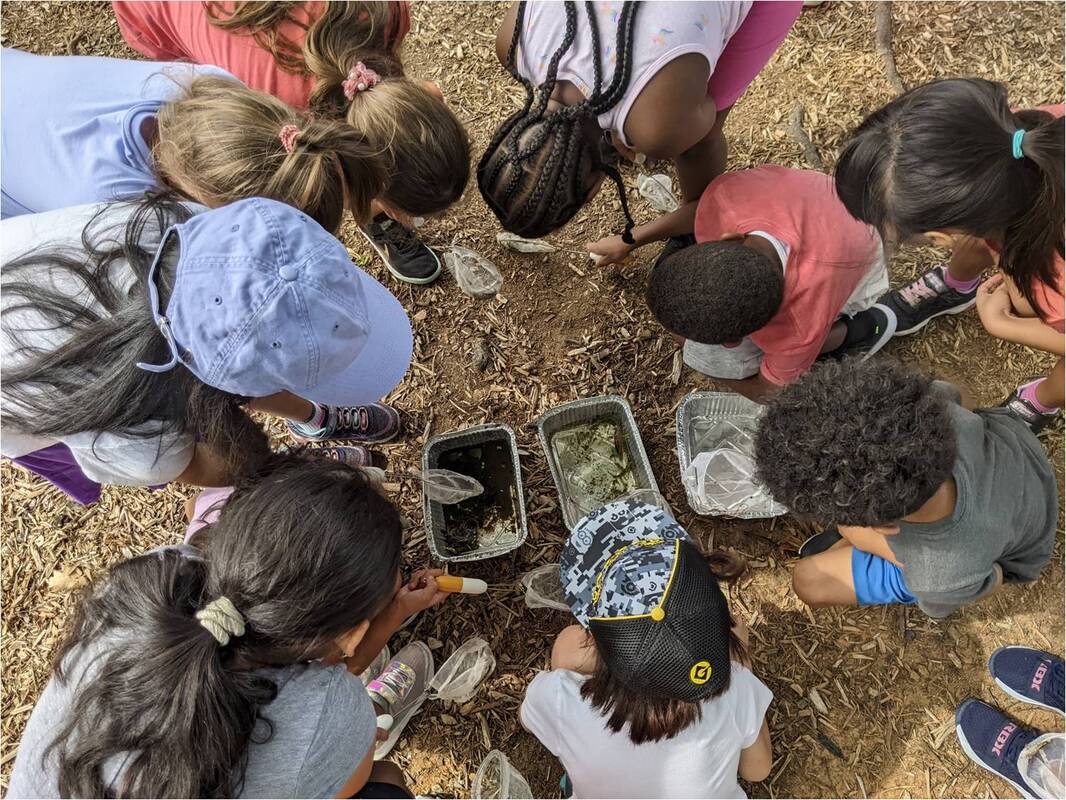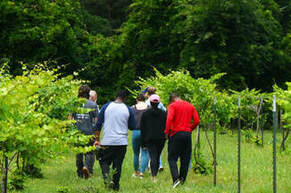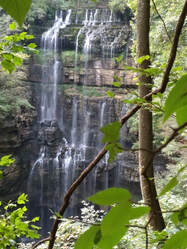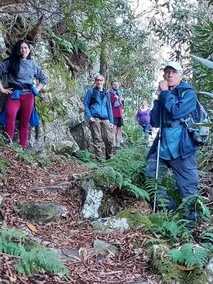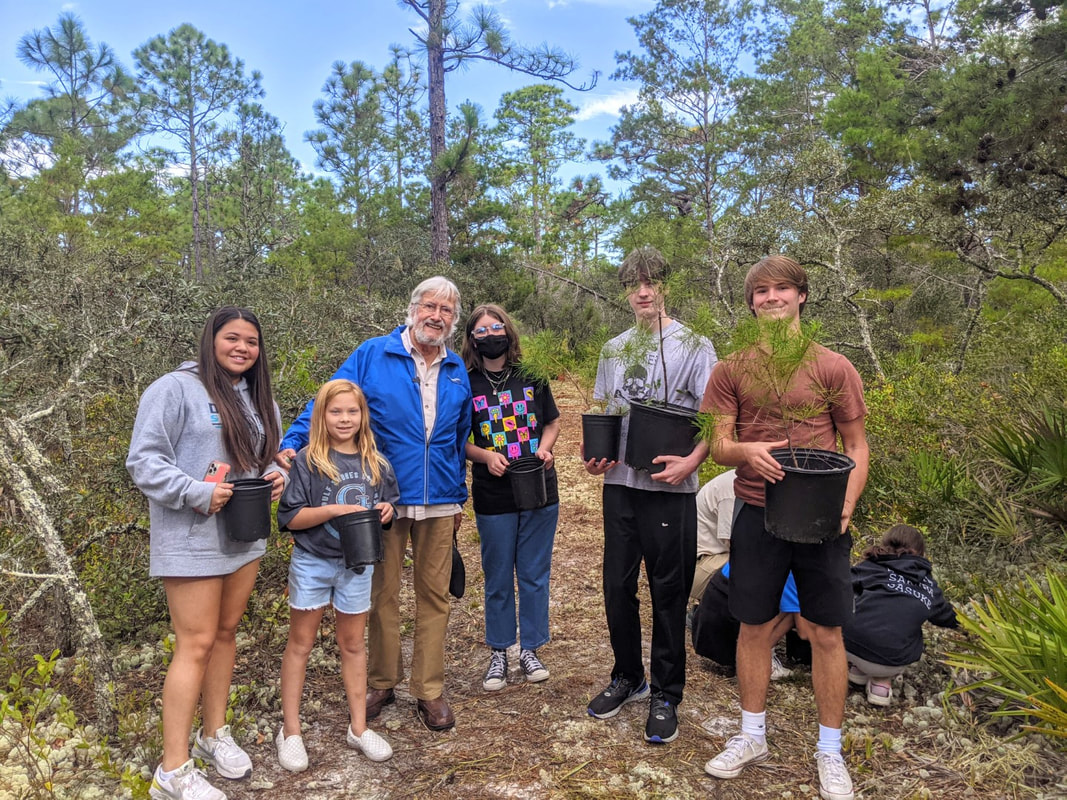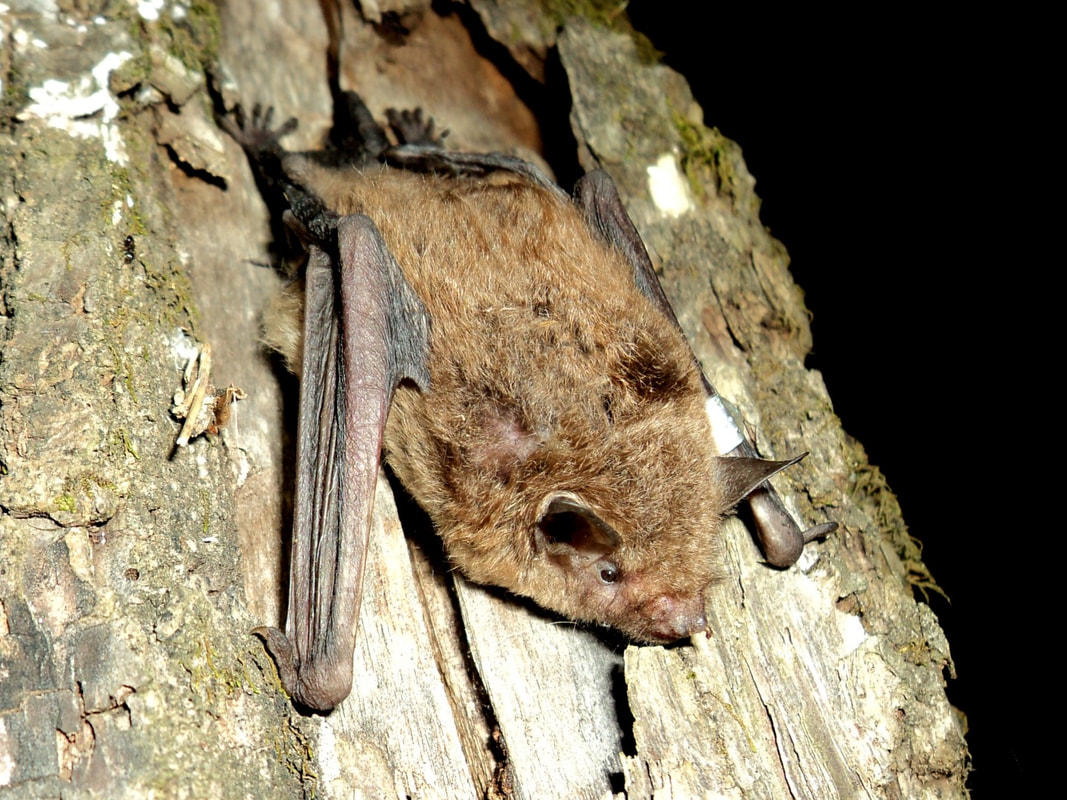What is "Fiscal Sponsorship"?
|
As a public charity that is tax-exempt under Internal Revenue Code Section 501(c)(3), Southern Conservation Partners can legally and properly conduct a program of support to individuals and nonexempt organizations. SCP assists projects led by others that are deemed by SCP to be in accord with and supportive of its own mission to save, honor, and enhance the natural heritage of the southern United States. SCP can choose to support a project financially, in circumstances when project leaders need a 501(c)(3) public charity sponsor to receive funds and pass them on to the project. SCP must approve each project and will maintain complete discretion and control over funds donated or granted in support of the approved project.
As fiscal sponsor, SCP takes care of the fiduciary and administrative aspects of managing funds that have been contributed for a project so that its leaders can focus on project activities and strategies. Fiscal sponsorship of an approved project will most often be temporary, either for the limited term of the project, or until such time when the project organizers obtain their own tax-exempt corporate status. Occasionally SCP may consider managing the financial affairs of a smaller organization that has already established its own 501(c)(3) public charity corporate status. This sponsorship mechanism enables groups to undertake projects that match the mission of Southern Conservation Partners without having to incorporate. Fiscal sponsorship of endorsed projects is a central program element of Southern Conservation Partners. |
Current Sponsored Projects
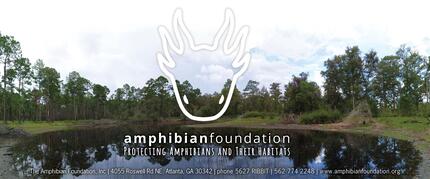
Amphibian Foundation
Southern Conservation Parners in 2020 became fiscal sponsor for the Atlanta-based Amphibian Foundation. According to the IUCN, 43% of the world's amphibians are in catastrophic decline or are already extinct. This percentage is higher than declining mammals and birds combined. Amphibians are disappearing from pristine environments as well as developed areas. Dedicated to connecting individuals, communities, and organizations to create and implement lasting solutions to the global amphibian extinction crisis, the Foundation offers unique educational opportunities (all ages) in which to learn about amphibians and inspire conservation. Southern Conservation Partners is providing fiscal sponsorship, with initial focus on an anticipated grant supporting the Foundation's new Bridge Program for Conservation Research, a unique opportunity for adults (18+) to conduct conservation and biological research in a collaborative and mentored scientific environment.
Southern Conservation Parners in 2020 became fiscal sponsor for the Atlanta-based Amphibian Foundation. According to the IUCN, 43% of the world's amphibians are in catastrophic decline or are already extinct. This percentage is higher than declining mammals and birds combined. Amphibians are disappearing from pristine environments as well as developed areas. Dedicated to connecting individuals, communities, and organizations to create and implement lasting solutions to the global amphibian extinction crisis, the Foundation offers unique educational opportunities (all ages) in which to learn about amphibians and inspire conservation. Southern Conservation Partners is providing fiscal sponsorship, with initial focus on an anticipated grant supporting the Foundation's new Bridge Program for Conservation Research, a unique opportunity for adults (18+) to conduct conservation and biological research in a collaborative and mentored scientific environment.
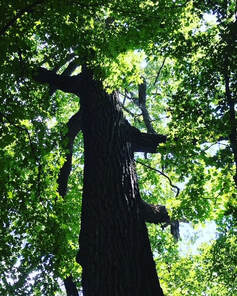
Conserve Nashville's Highland Rim Forest
In March of 2023, Southern Conservation Partners' Board endorsed a new project in Nashville, Tennessee, and adopted it for fiscal sponsorship. Its mission is to Conserve Nashville’s Highland Rim Forests, linking Radnor, Warner Parks, West Meade, Bell’s Bend, Beaman, and White’s Creek and to protect air, waters, wildlife, scenery, and our children’s future. Rising to more than 1,000 feet in elevation, Nashville's Highland Rim arcs around the city to the West and supports centuries-old forests. Exploding population growth, land speculation and development, and aging landownership are fragmenting these forests into smaller parcels. Without these productive forests, Nashville faces higher summertime temperatures, polluted streams, degraded scenery, and compromised air quality. This project seeks public funding to match private funds to conserve this forest corridor now, with a completion date coinciding with the 2040 time frame outlined in "NashvilleNext." Multiple agencies have an interest in parks, wildlife areas, state parks, and state natural areas in this forest corridor. The project will strengthen the alliance of partner organizations and agencies to adopt strategies to conserve conservation easements throughout this corridor. For more information READ THIS and visit the project's WEBSITE . |

Earthseed Land Collective
Southern Conservation Partners is fiscal sponsor for an exciting project in Durham, North Carolina, which advances the goals of "whole people and whole communities" and focuses on engaging and including People of Color in achieving food justice and food sovereignty. Earthseed is a center for community resilience and stewardship. The Collective has dedicated its 48-acre property for purposes of collective subsistence farming, food justice, and land cooperation, healing, and liberation. About half of the property (largely the portion in forest cover) is protected by a permanent conservation easement held with the Triangle Land Conservancy, which safeguards public water resources in the Falls Lake and upper Neuse River watershed. Southern Conservation Partners is a conduit for receiving charitable grant funds supporting this demonstration project.
|
|
Southern Conservation Partners depends on volunteers and donations to finance our sponsored projects. Consider becoming a partner and offering financial support to a project. You can send a check or donate through our secure online giving page offered through PayPal. THANK YOU!
|
|
A New Effort to Help Birds and the Environment
Southern Conservation Partners (SCP) is the fiscal sponsor for a new effort to help stem catastrophic losses of bird populations and natural habitats. Pitstop for the Birds will integrate nature with transportation infrastructure by creating small wildlife-friendly natural gardens and public environmental engagement features in combination with electric-vehicle charging stations. Pitstop for the Birds is a unique, innovative, and scalable project that can significantly impact bird populations, the environment, and public engagement with the needs of migrating birds. The project is currently in the development phase and is being implemented in North Carolina. The project’s objectives include:
|
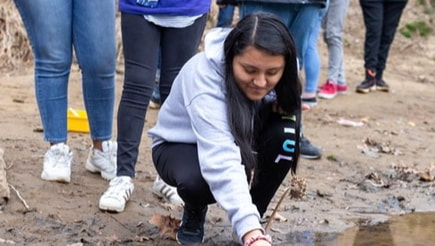
RootEd Project: Connecting Students with Communities and Nature
Southern Conservation Partners in July 2021 entered partnership and fiscal sponsorship with Constructive Learning Design to conduct the RootEd project, designed to engage students and schools in local parks and other community improvement projects in western North Carolina. The project will build community sustainability and youth engagement through a combination of mentoring and assisting school teachers; developing partnerships among schools and their students with local communities and businesses; and creating and sharing resources, curricula, stories, and opportunities for greater involvement by K-16 students in solving real problems in their communities benefiting people and nature. READ MORE.
Southern Conservation Partners in July 2021 entered partnership and fiscal sponsorship with Constructive Learning Design to conduct the RootEd project, designed to engage students and schools in local parks and other community improvement projects in western North Carolina. The project will build community sustainability and youth engagement through a combination of mentoring and assisting school teachers; developing partnerships among schools and their students with local communities and businesses; and creating and sharing resources, curricula, stories, and opportunities for greater involvement by K-16 students in solving real problems in their communities benefiting people and nature. READ MORE.
Speaking of Gardening Symposium in Asheville NC
SCP in early 2024 became fiscal sponsor for the annual gardening symposium for its 25th annual event in Asheville, NC. The two-day symposium (scheduled for August 1-2, 2024 ) convenes hundreds of gardening and horticultural practitioners and enthusiasts for lectures and information exchange, with emphasis placed on incorporation and conservation of native plants.
Speaking of Trees pilot environmental education film series
SCP in early 2024 became fiscal sponsor for the Coastal Plain Conservation Group to develop a pilot series of public environmental educational films designed to connect people with nature and focused on encouraging people to get outside and become greater aware and appreciative about the natural world outside their doors. The pilot film series begins with cinematic guided hikes in accessible forests throughout North Carolina. The producers are hosts of a NPR public radio podcast program series that introduces and interprets native habitats and keystone species in North Carolina's coastal region.
SCP in early 2024 became fiscal sponsor for the annual gardening symposium for its 25th annual event in Asheville, NC. The two-day symposium (scheduled for August 1-2, 2024 ) convenes hundreds of gardening and horticultural practitioners and enthusiasts for lectures and information exchange, with emphasis placed on incorporation and conservation of native plants.
Speaking of Trees pilot environmental education film series
SCP in early 2024 became fiscal sponsor for the Coastal Plain Conservation Group to develop a pilot series of public environmental educational films designed to connect people with nature and focused on encouraging people to get outside and become greater aware and appreciative about the natural world outside their doors. The pilot film series begins with cinematic guided hikes in accessible forests throughout North Carolina. The producers are hosts of a NPR public radio podcast program series that introduces and interprets native habitats and keystone species in North Carolina's coastal region.
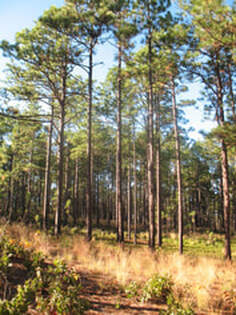
Longleaf Pine Forest Preservation Project
Southern Conservation Partners is part of a coalition of efforts to save and restore natural longleaf pine forests across that tree’s original six-state range in the southern U.S. Longleaf pine once dominated forest cover--93 million acres in the southern Atlantic and Gulf Coastal regions. But surviving tracts of longleaf pine forest have been reduced to less than 3 percent of that original extent. Many of the native plant and animal species endemic to longleaf pine-dominated ecosystems are in danger of extinction. SCP in 2016-2017 was fiscal sponsor for an inventory of surviving tracts of privately owned longleaf pine-dominated forests in the NC Sandhills region, and provides ongoing advice on management and conservation of longleaf pine forest tracts. In 2020, SCP conducted a survey of private land conservancies and trusts across the region to learn about their experiences with protecting, restoring, and managing longleaf pine forest habitat. Private land trusts collectively have conserved over a quarter million acres of longleaf pine forest habitats. We produced an online conference workshop and a report on our survey findings for the Longleaf Alliance. In 2021 we partnered again with the Longleaf Alliance to produce another webinar and journal article about land trusts involvement in longleaf forest protection and restoration. In 2024 SCP is a financial sponsor of Saving Our Savannas: Stories of the Longleaf Pine: a six-month-long series of programs (many online) and field trips offered by the North Carolina Botanical Garden and its partners. See schedule and registration instructions.
Southern Conservation Partners is part of a coalition of efforts to save and restore natural longleaf pine forests across that tree’s original six-state range in the southern U.S. Longleaf pine once dominated forest cover--93 million acres in the southern Atlantic and Gulf Coastal regions. But surviving tracts of longleaf pine forest have been reduced to less than 3 percent of that original extent. Many of the native plant and animal species endemic to longleaf pine-dominated ecosystems are in danger of extinction. SCP in 2016-2017 was fiscal sponsor for an inventory of surviving tracts of privately owned longleaf pine-dominated forests in the NC Sandhills region, and provides ongoing advice on management and conservation of longleaf pine forest tracts. In 2020, SCP conducted a survey of private land conservancies and trusts across the region to learn about their experiences with protecting, restoring, and managing longleaf pine forest habitat. Private land trusts collectively have conserved over a quarter million acres of longleaf pine forest habitats. We produced an online conference workshop and a report on our survey findings for the Longleaf Alliance. In 2021 we partnered again with the Longleaf Alliance to produce another webinar and journal article about land trusts involvement in longleaf forest protection and restoration. In 2024 SCP is a financial sponsor of Saving Our Savannas: Stories of the Longleaf Pine: a six-month-long series of programs (many online) and field trips offered by the North Carolina Botanical Garden and its partners. See schedule and registration instructions.

Venus Flytrap Champions
Southern Conservation Partners has joined a coalition of public and private efforts to protect the iconic Venus Flytrap, a carnivorous plant species, and restore more habitat for its survival. Natural populations of the rare and imperiled Venus Flytrap exist only in a few surviving wet pine savanna habitats in the coastal region of North and South Carolina (within a 100-mile ellipse around Wilmington, NC). The Venus Flytrap has long been recognized as a threatened species in the two states and is being reviewed for federal listing under the Endangered Species Act. In addition to illicit exploitation of remnant populations for the rare plant trade, the savanna habitats suitable for Venus Flytraps continue to be destroyed as development pressures accelerate in the coastal Carolina lowlands. While most of the plant’s remaining habitats survive on publicly owned lands, a few populations remain on privately owned properties. The coalition of conservation organizations, Venus Flytrap Champions, is working to implement a protection strategy to recognize private landowners and promote habitat management practices that sustain populations of this unique and endangered plant species. Read more on the Champions WEBSITE.
Southern Conservation Partners has joined a coalition of public and private efforts to protect the iconic Venus Flytrap, a carnivorous plant species, and restore more habitat for its survival. Natural populations of the rare and imperiled Venus Flytrap exist only in a few surviving wet pine savanna habitats in the coastal region of North and South Carolina (within a 100-mile ellipse around Wilmington, NC). The Venus Flytrap has long been recognized as a threatened species in the two states and is being reviewed for federal listing under the Endangered Species Act. In addition to illicit exploitation of remnant populations for the rare plant trade, the savanna habitats suitable for Venus Flytraps continue to be destroyed as development pressures accelerate in the coastal Carolina lowlands. While most of the plant’s remaining habitats survive on publicly owned lands, a few populations remain on privately owned properties. The coalition of conservation organizations, Venus Flytrap Champions, is working to implement a protection strategy to recognize private landowners and promote habitat management practices that sustain populations of this unique and endangered plant species. Read more on the Champions WEBSITE.
Some Past Sponsored Projects

North Carolina Biodiversity Project
Southern Conservation Partners provided initial fiscal sponsorship for the North Carolina Biodiversity Project through a limited partnership arrangement. SCP helped secure funds in support of this project. The NCBP team is composed of volunteer conservation biologists, taxonomic experts, nature photographers, and amateur naturalists with decades of experience studying the state’s native fauna and flora. The NCBP is dedicated to increasing public awareness and appreciation for the state’s diversity of species and ecosystems, as well as their conservation needs. To promote these goals, the NCBP has created a series of publicly accessible websites (hosted by the State of North Carolina’s Division of Parks and Recreation) that provide checklists, photo images, life histories, and conservation information for the state’s wide range of species. Each taxonomic website is managed by a team of volunteers. This citizen-science project invites submission of new range information for the native species of North Carolina for vetting and inclusion on the websites. Biodiversity is the variety of all life and their interactions. All life is interconnected. All living things need one another. Now more than ever, we must preserve, defend, and build back biodiversity in our home regions and all around the world. Biodiversity is fundamental not just for human well-being, but for all life on this planet. Over 1 million species of plants and animals currently face extinction worldwide.
Southern Conservation Partners provided initial fiscal sponsorship for the North Carolina Biodiversity Project through a limited partnership arrangement. SCP helped secure funds in support of this project. The NCBP team is composed of volunteer conservation biologists, taxonomic experts, nature photographers, and amateur naturalists with decades of experience studying the state’s native fauna and flora. The NCBP is dedicated to increasing public awareness and appreciation for the state’s diversity of species and ecosystems, as well as their conservation needs. To promote these goals, the NCBP has created a series of publicly accessible websites (hosted by the State of North Carolina’s Division of Parks and Recreation) that provide checklists, photo images, life histories, and conservation information for the state’s wide range of species. Each taxonomic website is managed by a team of volunteers. This citizen-science project invites submission of new range information for the native species of North Carolina for vetting and inclusion on the websites. Biodiversity is the variety of all life and their interactions. All life is interconnected. All living things need one another. Now more than ever, we must preserve, defend, and build back biodiversity in our home regions and all around the world. Biodiversity is fundamental not just for human well-being, but for all life on this planet. Over 1 million species of plants and animals currently face extinction worldwide.
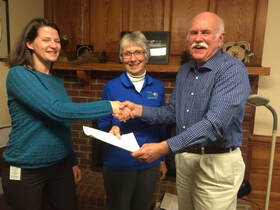
North Carolina Natural Heritage Program assistance
Southern Conservation Partners beginning in 2018 initiated an agreement to assist North Carolina's state Natural Heritage Program. Initially SCP provided financial assistance to aid the NC NHP in the process of formally recording notice of articles of dedication for more than 190 State-owned nature preserves with Counties' Registers of Deeds in 77 (of the 100). In the current phase of our assistance to the NC Natural Heritage Program, SCP is financially subsidizing costs incurred by volunteers in monitoring of some of the more than 530 dedicated nature preserves and registered natural areas across North Carolina. Southern Conservation Partners in partnership with the NC NHP, The Nature Conservancy, NC Botanical Garden and others, co-sponsored a Forum on the Future of Conservation: Biodiversity, Resilience & Equity at the NCBG in Chapel Hill in September, 2022.
Southern Conservation Partners beginning in 2018 initiated an agreement to assist North Carolina's state Natural Heritage Program. Initially SCP provided financial assistance to aid the NC NHP in the process of formally recording notice of articles of dedication for more than 190 State-owned nature preserves with Counties' Registers of Deeds in 77 (of the 100). In the current phase of our assistance to the NC Natural Heritage Program, SCP is financially subsidizing costs incurred by volunteers in monitoring of some of the more than 530 dedicated nature preserves and registered natural areas across North Carolina. Southern Conservation Partners in partnership with the NC NHP, The Nature Conservancy, NC Botanical Garden and others, co-sponsored a Forum on the Future of Conservation: Biodiversity, Resilience & Equity at the NCBG in Chapel Hill in September, 2022.
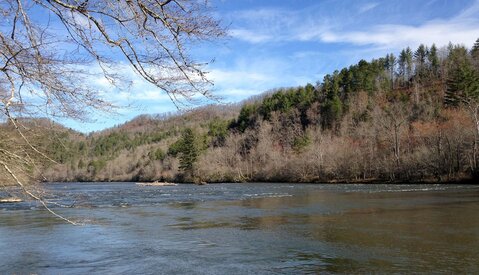
French Broad River Watershed Protection Partnership: a demonstration project
Southern Conservation Partners initiated the process of dialogue among private conservation and environmental protection organizations and federal-state-and local public agencies to form a coalition concerned for protection and restoration of water quality, water resources, and the water-dependent biota and environmental assets of the French Broad River and all its tributary streams in western North Carolina. Diminished water quality in the river and its tributary steams is threatening the basis of that region's economy: its natural capital. In January 2017, Southern Conservation Partners, in partnership with the Southeastern Partnership for Forests and Water, convened 45 people representing 28 public and private organizations for initial discussion about the benefits of forming a coalition for the purpose of protecting and restoring the water resources and conserving lands critical to water quality in the upper French Broad River Basin. The French Broad River Partnership formally organized in 2018 as a coalition of dozens of public agencies and private organizations working together in collaboration to maintain and improve stream health and water quality within the entire French Broad River Watershed. The Partnership recognizes that the river watershed is the essential source of public drinking water and recreation while supporting biodiversity, agriculture, forestry, and economic growth. We are pleased that this coalition continues to make major advances in protecting water quality and expanding public outreach and education in its Love Your Watershed ongoing project.
Southern Conservation Partners initiated the process of dialogue among private conservation and environmental protection organizations and federal-state-and local public agencies to form a coalition concerned for protection and restoration of water quality, water resources, and the water-dependent biota and environmental assets of the French Broad River and all its tributary streams in western North Carolina. Diminished water quality in the river and its tributary steams is threatening the basis of that region's economy: its natural capital. In January 2017, Southern Conservation Partners, in partnership with the Southeastern Partnership for Forests and Water, convened 45 people representing 28 public and private organizations for initial discussion about the benefits of forming a coalition for the purpose of protecting and restoring the water resources and conserving lands critical to water quality in the upper French Broad River Basin. The French Broad River Partnership formally organized in 2018 as a coalition of dozens of public agencies and private organizations working together in collaboration to maintain and improve stream health and water quality within the entire French Broad River Watershed. The Partnership recognizes that the river watershed is the essential source of public drinking water and recreation while supporting biodiversity, agriculture, forestry, and economic growth. We are pleased that this coalition continues to make major advances in protecting water quality and expanding public outreach and education in its Love Your Watershed ongoing project.
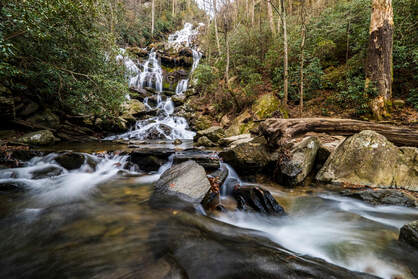
VentureLife Films: "The River Runs On" documentary
Southern Conservation Partners was a fiscal sponsor for Asheville-based VentureLife Films, which secured grants and contributions to produce a documentary film about the Pisgah and Nantahala National Forests. THE RIVER RUNS ON follows conservationists as they struggle to manage two of the most important national forests in America: the Pisgah and Nantahala. The film follows the release of a forest management plan that will dictate how these two forests are managed for the next twenty years. The result is a meditation on our relationship to nature, our role in managing lands and what it may mean for the future. Stream the film.
VentureLife Films: "The River Runs On" documentary
Southern Conservation Partners was a fiscal sponsor for Asheville-based VentureLife Films, which secured grants and contributions to produce a documentary film about the Pisgah and Nantahala National Forests. THE RIVER RUNS ON follows conservationists as they struggle to manage two of the most important national forests in America: the Pisgah and Nantahala. The film follows the release of a forest management plan that will dictate how these two forests are managed for the next twenty years. The result is a meditation on our relationship to nature, our role in managing lands and what it may mean for the future. Stream the film.
|
Other Special Projects We Support
On occasion, Southern Conservation Partners (SCP) provides financial assistance to help launch projects that contribute to our mission and purpose. The following projects have received small seed grants: Bernheim Arboretum and Forest Preserve (KY) The Bernheim Arboretum and Forest Preserve was awarded a small grant from SCP in 2022 to to help create roadside prairie plants display areas along Bernheim's Prairie Roadsides Project. The funds have supported the installation of 5 acres of roadside prairie displays distributed along Bernheim’s Forest Hill Drive. The installations will include prairie species such as blazing star, coneflowers, milkweed, rattlesnake master, and other native pollinator species of conservation and aesthetic value. The roadside planting sites will also contain some areas of bottomland wetland and riparian native plant species. These displays will improve pollinator habitat and habitat diversity within the public section of the 16,140-acre forest preserve. These highly visible prairie demonstrations also provide interpretive opportunities to educate visitors on these species and their role in creating healthy habitats. Davidson Lands Conservancy (NC) SCP in 2023 awarded Davidson Lands Conservancy a grant in support of DLC’s Learn Works, NatureFest, Freedom School, and World of Wonder programs, in recognition of Davidson Lands Conservancy's exemplary initiatives in engaging its community and youth in appreciating the wonders of nature and responsibilities for stewardship of environmental assets. SCP recognizes Davidson Lands Conservancy for its stellar performance and initiatives in engaging its community and youth in appreciating the wonders of nature and responsibilities for stewardship of environmental assets. Ellerbe Creek Watershed Association (NC) SCP’s grant awarded in 2022 to the Ellerbe Creek Watershed Association ( in Durham, NC) assisted its efforts to broaden engagement of its community members, predominated by Black and other people of color, with a demonstration project on conserved land in the city. The project of restoring native muscadine and scuppernong grape arbors in ECWA’s Veasey Nature Preserve engaged its neighbors in the culturally diverse neighborhood and will provide a gateway for greater community involvement in ECWA’s array of programs including public environmental education, hikes in its preserved areas, natural habitats restoration and removal of invasive species. SCP’s financial assistance in this demonstration project contributed in building relationships between people and the natural environment contributing to increased community well-being and resourcefulness; promoting a collaborative culture and cooperative practices; and enhancing regenerative and sustainable agriculture and horticultural practices. This support aided ECWA not only to continue to restore and care for the vineyard but also to support its work to further engage with the Black community in this urban watershed. Friends of Virgin Falls, Cumberland Mountains (TN) Friends of Virgin Falls is coalescing allied interests to create a network of hiking trails connecting conserved and publicly accessible natural areas on 74,000 acres of public lands on Tennessee’s Cumberland Plateau, including Virgin Falls-Bridgestone Firestone Wilderness Area, Dog Cove Nature Preserve, Lost Creek Nature Preserve, Boy Scouts of America Latimer Reservation, Bledsoe State Forest, and Fall Creek Falls State Park, home to the 256-foot tall waterfall. The SCP "seed grant" awarded in 2022 will help finance a trail map to show existing trails and an eventual inter-connected 80 miles of wilderness hiking. Friends of West Meade Hills (Nashville, TN) Friends of West Mead Hills is expanding protection of an urban forest corridor in west Nashville, Tennessee, with focus on protecting an additional 100-acres of older-growth forests. SCP’s “seed grant" helps with project plans and leveraging additional public and private funds, and will contribute to the growth of Nashville's Highlands Rim Forest Protection Project. Frosted Elfin Population Enhancement (VA) Southern Conservation Partners has helped to launch an exciting new (2024) project led by the Virginia Natural Heritage Program (VaNHP) to rescue a declining population of Frosted Elfin (Callophrys irus) at the South Quay Sandhills Natural Area Preserve. The small, non-migratory hairstreak butterfly is known from 25 states but is experiencing severe declines in much of its range, including Virginia. The species is under review by US Fish and Wildlife Service for possible listing under the Endangered Species Act. With help from the McGuire Center for Lepidoptera and Biodiversity in Florida, VaNHP will collect Frosted Elfin individuals from Virginia, rear them at the McGuire Center facility, and then release adult butterflies to the home site to boost the local population at the preserve. VaNHP staff will also work to increase the population of sundial lupine, the butterfly's host plant, at the preserve through active management such as mid-story thinning, prescribed burning, and seed collection and dispersal. Greenway & Trail Networking (northeast TN–southwest VA ) Efforts are underway to design and establish a network of greenways and trails that will connect the existing Virginia Creeper Trail (from Damascus and Abingdon, Virginia) to existing and proposed greenway trails in Bristol, VA/TN, and south to the Tweetsie Trail and Doe Mountain trails, Johnson City area greenways, and Roan Mountain in Northwest TN. SCP’s “seed grant" will help finance trails planning. Gulf Coast Eco Center (Gulf Shores, AL) SCP’s grant to the Gulf Coast Center for Ecotourism & Sustainability will contribute to this new program’s development of a native tree nursery and habitat restoration project (including planting of 13,500 sand pine seedlings) that will engage local schools and youth, community residents, and visitors in hands-on environmental education and conservation. For more information about the exciting Gulf Coast Eco Center visit www.gulfcenter.org Kentucky Natural Lands Trust Kentucky Natural Lands Trust (KNLT) received two small grants from SCP to initiate a research project designed to inventory populations of imperiled bat species residing on the complex of nature preserves along the Pine Mountain Wildlands Corridor, which extends more than 125 miles from Tennessee through eastern Kentucky to Virginia and forms the first (easternmost) of the Appalachian ridges. The project is directed by KNLT in partnership with Lincoln Memorial University. Ultrasonic recorders have been placed at select locations to monitor bat foraging activity. Analysis of recorded bat calls aids in species identification and allows for a noninvasive technique to understand the impacts of climate change on sensitive and unique habitats and species. This research project has placed ultrasonic recorders at select locations on Kentucky’s Pine Mountain to monitor bat foraging activity in relation to climate change over a 5–10-year timeframe. The data collected and analyzed by Lincoln Memorial staff and students using the analysis software aids in bat identification. This project allows for a noninvasive technique to be implemented by KNLT staff, LMU staff, and LMU students to further understand the impacts of climate change on sensitive and unique habitats and species. The recorders have collected data on eight species of bats. This research was highlighted at The Wildlife Society 2023 Annual Conference in Louisville, Kentucky. Land Trust for Louisiana Grants from SCP will be used to match other sources of funding to produce a video about the shortleaf pine/oak-hickory woodland type, which historically dominated the rolling uplands of much of northern Louisiana (north of longleaf pine range). Once occupying an estimated 5–7 million acres, this forest type has been almost completely lost; high quality examples are exceedingly rare, arguably rarer than longleaf pine woodlands, which have received much conservation attention in recent years. Because many of the best remnant shortleaf pine woodlands are in private ownership, landowner education and outreach may be one of the best ways to increase conservation of this important habitat type. The video will focus on the protection and restoration of a 500-acre property containing old-growth forest and managed for shortleaf pine habitat conservation. Another SCP grant to the Land Trust for Louisiana was awarded by SCP to produce a second video film focused on protection and restoration of longleaf pine forest habitats in the Gulf coast region. Moore Mountain Longleaf Pine Savanna restoration research project (AL) SCP's small grant awarded in 2024 to Auburn University at Montgomery's department of environmental sciences will help establish a long-term research program at the Moore Mountain preserve, the goal of which is to evaluate the success of different restoration techniques for montane longleaf pine savanna ecosystems, including native understory vegetation. Montane longleaf pine (Pinus palustris) forests are even rarer than longleaf pine ecosystems found in the coastal plain and are highly threatened by human activities, including fire suppression, conversion to pine plantations, and urban sprawl. Longleaf pine forests have been reduced to a mere 3% of their original range. Restoration of montane longleaf pine ecosystems is of high conservation priority in the southeastern United States. Small-Whorled Pogonia - prescribed burning effects research project (VA) SCP's small grant to Virginia Tech University's School of Plant and Environmental Science awarded in 2024 advances research on the effects of prescribed fire on the federally threatened small-whorled pogonia orchid, Isotria medeoloides. This species often occurs in sites with a history of fire, but for which there is as yet no scientific evidence of effects of fire on its population ecology. In the absence of rigorous research supporting the use of disturbances to protect and restore threatened and endangered species, management agencies are apt to take no action, ultimately increasing the likelihood of species’ continued declines. This research will principally take place at the Mount Joy Pond Natural Area Preserve in Virginia’s Shenandoah Valley. SMDC (Short Mountain–Dry Creek) Community Land Trust (TN) Primary purposes of the SMDC Community Land Trust are to make land and housing available to and affordable for low-income people and to create mechanisms for land ownership and succession for the diverse and rural LGBTIA+ community in Middle Tennessee. SMDC is dedicated to protecting waterways, undeveloped woodlands, and ecosystems while maintaining the long-term health and safety of the natural community. SCP has provided a small grant to SMDC Community Land Trust in to help develop its website, produce educational materials, and assist with its transactional costs for acquiring property. |
|

